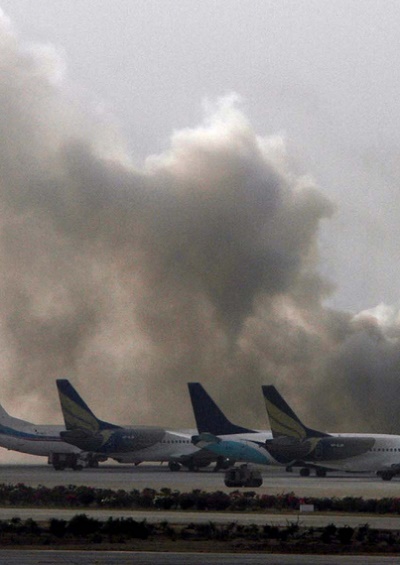Pakistan Needs Regional and Global Alliances to Fight the Extremists
Will the attack on Karachi’s airport change the way Pakistan’s government deals with the Taliban?
June 19, 2014

Pakistan just launched another military operation — Zarb-e-Azb — against the extremists in Waziristan. The name of the operation means sharp and cutting or surgical.
This is not the first such operation and perhaps will not be the last of its kind. But if it is executed well, it may not require another one for some time. This may give the beleaguered country an opportunity to recoup from the persistent terror attacks that it faces nearly everyday.
This military operation was inevitable, given public outrage at the dastardly attacks on Jinnah International Airport in Karachi. This attack — which occurred late in the evening of June 15 — not only killed 26 military personnel and civilians, but also underscored the dangerously fragile condition of security in Pakistan.
The attack on Karachi’s airport clearly was a tipping point and the government of Prime Minister Nawaz Sharif. Previously, he had been willing to give diplomacy a chance, but is now forced to respond militarily.
Rhetoric aside, it remains to be seen how serious this military venture really is. The Pakistani military, for its part, hopes to seriously damage the many extremist groups that operate out of Waziristan.
Counterinsurgency is fraught with peril
As Americans have discovered in Iraq and elsewhere, popular insurgencies are hard to suppress. It is difficult to separate civilians from the enemy and the innocent from the malignant.
Every misstep increases the intensity of the insurgency and undermines public support for use of force. Counterinsurgency strategies, especially when employed at home, also have very real economic effects. They destroy the infrastructure of the nation, cause unemployment, slow the economy, exacerbate sectarianism, frighten away foreign investors and significantly reduce prospects for internal and international trade.
The prolonged use of force also generates internally displaced refugees who will move away from the battle areas, towards Lahore, Karachi and Islamabad in search of safety. These movements will provide cover for fleeing militants — and will bring the war to the very cities whose protection is the main driver for conducting the military operation.
There are two fundamental problems with this operation. First, it assumes that the problem is geographically confined to Waziristan. However, the militancy has already infiltrated urban areas. According to some reports, a significant section of Karachi has effectively been “Talibanized.” Action in Waziristan alone will not contain or roll it back.
Second, Pakistan has undertaken this operation unilaterally. While the Pakistani army has perhaps the best intelligence on the militants and the most experience dealing with them and the power to hurt them, it would be much better if Pakistan worked to develop a regional and a global coalition to fight the insurgency.
Groups such as the Taliban (all varieties of them), Boko Haram, Islamic State of Iraq and Syria (ISIS) and al Qaeda are all manifestations of the same cancer that is eating away at the moral core of Muslim societies. While the damage they cause is local, they do present a global threat that must be fought in concert — rather than by host states alone.
A global coalition
That Pakistan has America’s support is obvious. The U.S. government has been pushing Pakistan to launch such a measure for quite some time now.
Military and economic aid will flow — and with it will come electronic intelligence and the inexorable reach of the dreaded drones. But limited international support will make it appear as if the Pakistani military is taking these steps at the behest of the United States. That will undermine the legitimacy of the operation and provide more ammunition for Taliban sympathizers to divert public anger towards the United States.
A global alliance that also includes the European Union, China and maybe even Turkey can strengthen the hand of the Pakistani government. It would impress upon the extremists and their supporters that they have the world to contend with — and not just the weak political will of Prime Minister Sharif.
Many of these nations share Pakistan’s interest in curbing Muslim extremists everywhere and will not hesitate to support. A little diplomacy from Islamabad and a quiet word from Washington can crystallize such a coalition to help Pakistan.
A regional coalition against the Taliban
But this isn’t just a matter of a global coalition, hard though that may be to achieve. The Waziristan region in Pakistan has become a watering hole for extremists who threaten many neighboring countries.
Besides Pakistan, India, Iran and Afghanistan all have strong interests in eliminating threats that emanate from the area. The problem is that most countries in the region feel that Pakistan is hunting with the hound and running with the hare at the same time.
Pakistan’s intelligence is suspected of nurturing many of the same groups for geopolitical reasons even as they threaten its own stability. This perception prevents Pakistan from developing closer relations with its neighbors who have the resources, the will and the interest to help Pakistan become free of terror.
A regional coalition will make the struggle against extremism more potent, more durable and less expensive. But it will take more than deft diplomacy to achieve. Pakistan must convince its neighbors that the alleged ties between the Pakistani state and the Taliban have been severed irreparably.
Perhaps the current operation will achieve that first step and help build the coalitions necessary to make the region safe.
Takeaways
The Taliban (all varieties of them), Boko Haram, ISIS and the Al Qaeda are all manifestations of the same cancer.
Domestic extremism is eating away at the moral core of Muslim societies.
The damage the extremists cause is local, but they do present a global threat that must be fought in concert.
Host states alone are unable to defeat the terrorist cancer.
A global alliance that includes EU, China and maybe even Turkey can strengthen the hand of the Pakistani government.
Many of these nations share Pakistan's interest in curbing Muslim extremists everywhere.
Read previous

Iraq’s Predictable Fate
June 18, 2014
